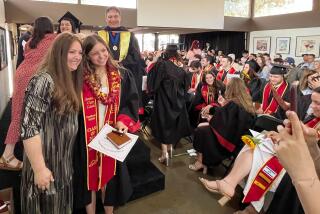Senioritis Strikes--as Predictable as Graduation
- Share via
Lorna Laparan, a senior and president of the student body at Cerritos High School, thought she had a premature case of senioritis last year. Now she knows she has it.
“School is such a turn-off,” she said. “I’d rather clean my room than do my homework!”
Like most of the 540 members of Cerritos’ class of 1987--indeed, like seniors everywhere--Lorna keeps forgetting why she should concentrate on calculus and English composition.
Something is ending forever, something unimaginably exciting is about to begin, and that seems infinitely more important than perfect attendance or spot quizzes or even term papers, all matters that formerly loomed large.
While the term senioritis does not appear in textbooks, psychologists contacted by The Times described it as a normal but often anxiety-ridden stage that teen-agers pass through on their way to adult autonomy.
Senioritis is rarely fatal. But, as one Southland school official pointed out, it is highly contagious: “It’s as bad as seasickness,” he said. And it is an annual trial for teachers and school administrators who find that their once-diligent, even driven students are suddenly as distractable as 3-year-olds.
Jim Kinney, director of student activities at Palos Verdes High School in Palos Verdes Estates, said the condition is as predictable as graduation. “It starts the same time every year--the moment the colleges send their acceptances out in mid-April,” he said. “You can almost set your watch by it. Then the weather gets nice. It’s a deadly combination.”
Asked to describe the syndrome, Kinney said: “It’s like cruise control in a car. The kids put themselves on automatic pilot.”
Cerritos High tries to keep its seniors from moving en masse to the beach by giving them assignments right up to the end of school. “We will not know until 3 o’clock on the 22nd of June who our non-grads are,” said Phyllis Brewer, assistant principal in charge of guidance at the school.
Hypothetically, a once-assiduous senior could do so badly in the last few months of school that he or she would not graduate on June 24. Brewer said that rarely happens. “I don’t recall anybody who failed because of senioritis,” she said. “Most of our non-grads have been working on it for a long time.”
Meanwhile, Laparan fights the urge to sleep in and wonders how her final English paper on writer Doris Lessing will ever get past the note-card stage. “We’re counting down the days,” the student leader said.
Liz Beckenbach, who graduated last week from Marlborough School in Hancock Park, remembers what she was like before she came down with senioritis.
“I was such a geek,” she said. “I turned everything in on time. I never ditched.”
On Dec. 13, she found out she had been accepted at Wesleyan University in Connecticut, the college of her choice, and a new Liz emerged.
“It happened overnight. Once I found out I was accepted, I came in the next day out of uniform!”
The old Liz would no more have come to school out of uniform than with a frog in her pocket. But that was before senioritis struck.
“Let’s face it,” said Lu B. Wenneker, college counselor at the private girls school. “Once they’ve got their college applications out of the way, it’s treading water. Most schools spend a great deal of time finding things to keep seniors interested and in school.”
Early Graduation
Senioritis was so widespread at Marlborough this year that the administration decided to hold graduation early, on May 20, instead of in June as in the past.
The school’s 70 seniors reported varied symptoms. Dena Crowder of Ladera Heights found herself going home at 10 o’clock in the morning more and more often (permitted by the school, if the senior’s classes are over and her parents approve).
Many seniors said they cut class only to reconvene at Gelati Per Tutti, a popular ice cream parlor on Melrose Avenue.
Apathy was endemic among second-semester seniors. As Kathy Durousseau succinctly put it: “It just doesn’t matter.”
Sara Golding, who lives in Los Feliz, was more specific. “Colleges will never see our second-semester grades,” said Sara, who has been accepted at Yale.
(That’s not strictly true, according to Wenneker. Colleges occasionally rescind their acceptances of students who perform abominably during the second semester of their senior year, but not often.)
What did suddenly matter to the Marlborough seniors was their friends and even those other students they did not really get to know and will probably never see again after graduation.
“There is nothing left but friendship,” Durousseau said.
“I hate the school more than I ever did, but I love the people,” another senior observed.
Surprising Sisterhood
The intense feeling of sisterhood among the Marlborough seniors came as a surprise to some. It is an extremely competitive institution, where most students are aware that they are scrambling for a handful of places at Ivy League and other highly selective colleges and universities.
But as Lori Matloff said: “The competition between us is gone, and we care about each other. I couldn’t be happier about some of the things that have happened to people if they had happened to me.”
Ambivalence was another common characteristic of seniors. As Matloff noted, “You’re torn because you want to get out of school, but your friends are here.”
This feeling of being divided is common among seniors, according to psychologists.
Herbert J. Freudenberger, a clinical psychologist and psychoanalyst who treats many adolescents in New York City, describes the senior year of high school as a time fraught with anxiety, not unlike that faced by people on the verge of retirement.
Substance Abuse
“Sometimes kids begin using more dope and alcohol as a way of not facing the anxieties and stresses and pressures they’re going to face by going out in the world,” Freudenberger said.
In Freudenberger’s view, a major concern for seniors is that their world will no longer be highly structured.
Once you are out of school, he noted, “the year doesn’t start in September, it starts in January.” Suddenly, he said, “seniors have too much space, too little to do, too much ambiguity.”
Moreover, once students graduate from high school, he said, they suddenly feel that they are responsible, rightly or wrongly, for what happens to them.
“They can’t blame other people anymore,” he said. “Now it’s them.”
Self-Fulfilling Prophecy?
Martin E. Ford, a developmental psychologist on the faculty of the Stanford University School of Education, is not sure whether senioritis is a genuine psychological phenomenon or a cultural tradition.
To some extent, Ford said, senioritis occurs “because adults expect it and tolerate it and legitimize it.”
At the same time, he said, “it certainly makes sense that people would reinvest their attention and energy and activity into alternate goals or pursuits that are now more relevant to them.”
In other words, it makes sense that seniors would start weaning themselves from an institution--high school--that will soon be closed to them.
As counselor Wenneker said: “There’s a certain fashionable antipathy toward the school in the senior year. But in the spring, when the reality of leaving hits them, there are tremendous tears. And the ones who are the most vocal about wanting to get out of here are the ones who weep the loudest at graduation.”
More to Read
Sign up for Essential California
The most important California stories and recommendations in your inbox every morning.
You may occasionally receive promotional content from the Los Angeles Times.










